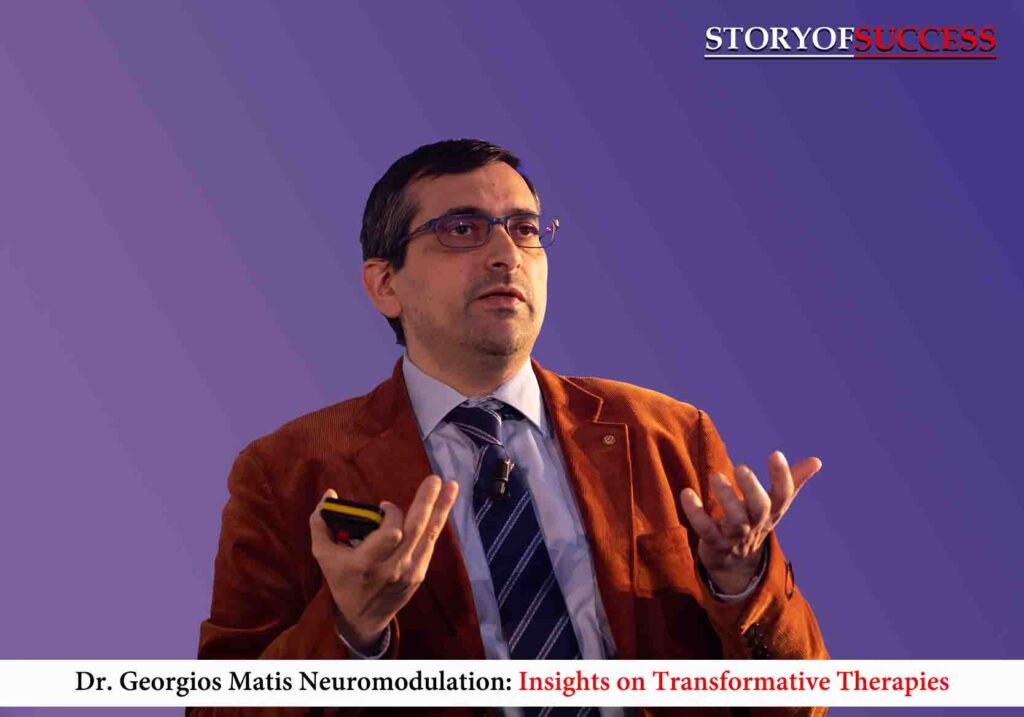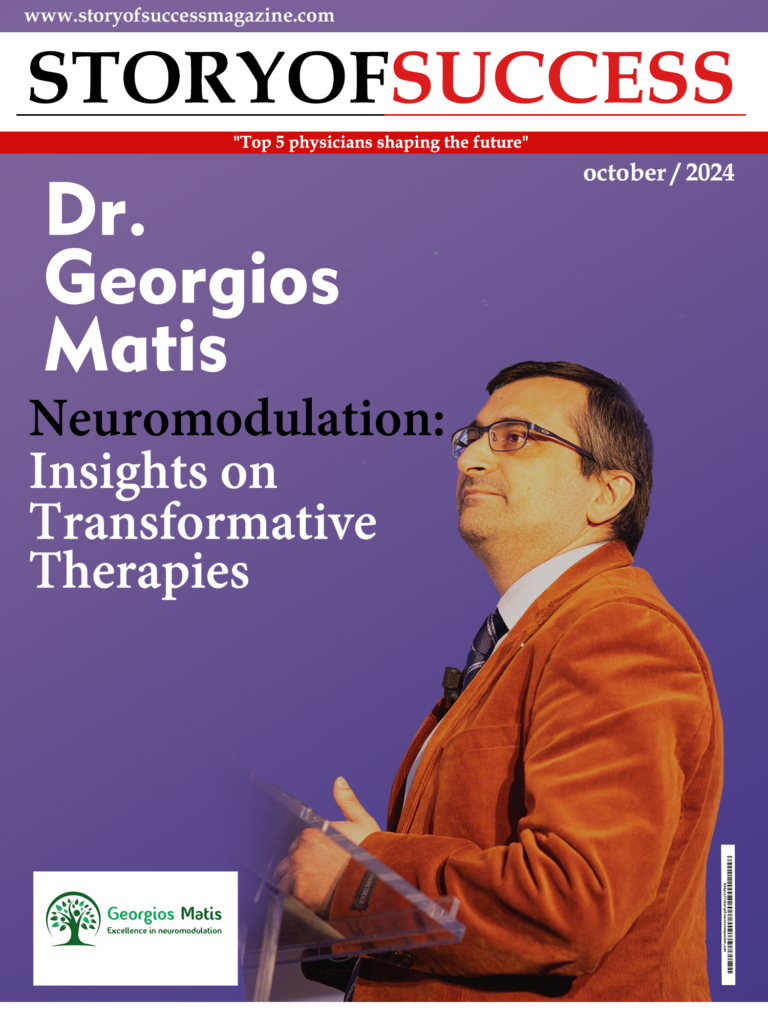
Dr. Georgios Matis Neuromodulation: Insights on Transformative Therapies

Pioneering Pain Relief: The Journey of a Neurosurgery Specialist
Dr. Georgios Matis has dedicated their career to transforming the lives of patients suffering from chronic pain and spasticity. After completing medical school at the Aristotle University of Thessaloniki, Greece Dr. Georgios Matis embarked on an impressive journey through prestigious fellowships in renowned institutions such as Weill Cornell Medical College and the University Hospital of Zurich. Since May 2014, they have been an integral part of the Department of Functional Neurosurgery at the University Hospital Cologne, currently serving as the Head of the Pain/Spasticity Section.
From the outset, Dr. Georgios Matis was motivated by a profound desire to alleviate suffering. Early experiences in neurosurgery revealed the devastating impact of chronic pain on patients’ lives, often limiting their ability to engage in everyday activities. This realization ignited a passion for exploring innovative solutions in pain management, particularly through neuromodulation techniques.
Neuromodulation represents a promising frontier, marrying neuroscience and technology to offer patients renewed hope where traditional treatments have failed. Dr. Georgios Matis has witnessed firsthand the transformative effects of these techniques, helping patients regain autonomy and improve their quality of life. The emotional satisfaction of facilitating such change drives Dr. Georgios Matis to continue exploring advancements in the field.
As the landscape of pain management evolves, Dr. Georgios Matis remains committed to pushing boundaries and expanding treatment possibilities. With each success story, they reaffirm their dedication to making a lasting impact in the lives of those in need.
Transforming Lives: Dr. Georgios Matis’s Leadership in Pain Management
Dr. Georgios Matis has carved a remarkable path in the field of chronic pain and spasticity management at the University Hospital Cologne. Leading a clinical team dedicated to these complex cases has presented both challenges and privileges, fueling his commitment to patient-centered care.
Central to Dr. Matis’s philosophy is the belief in a collaborative, multidisciplinary approach. He brings together neurosurgeons, pain specialists, physical therapists, and neuropsychologists to address not only the physical symptoms of pain and spasticity but also the broader impacts on patients’ lives. This teamwork is essential in delivering comprehensive care that enhances overall well-being.
A highlight of Dr. Matis’s career has been the successful implementation of neuromodulation techniques within his clinical practice. He took the initiative to spearhead training programs, ensuring that everyone on his team—from residents to seasoned practitioners—was well-versed in the latest advancements in neurostimulation and intrathecal drug delivery systems. This focus on continuous learning has strengthened the team’s capabilities in a rapidly evolving field.
Dr. Matis also emphasizes the importance of data-driven decision-making. He leads case reviews and quality improvement sessions to analyze treatment outcomes, refining protocols to enhance patient care. A standout project was a pilot program aimed at optimizing neuromodulation therapies for patients with spasticity due to spinal cord injuries. This initiative required meticulous coordination among team members to create personalized treatment plans, monitor progress, and make real-time adjustments based on individual responses.
The rewarding results—patients regaining function and independence—reinforce Dr. Matis’s commitment to expanding access to transformative treatments. His leadership not only enhances the expertise of his team but also exemplifies the essential qualities of empathy, resilience, and innovation in providing life-changing care. Dr. Matis continues to inspire those around him, dedicated to improving the lives of patients facing chronic pain and spasticity.
Dr. Georgios Matis: Commitment to Excellence in Pain and Spasticity Management
In the ever-evolving field of neuromodulation, staying abreast of advancements in pain and spasticity treatment is essential. Dr. Georgios Matis exemplifies this commitment through a multifaceted approach that combines ongoing education, research engagement, and active collaboration.
Dr. Matis prioritizes attendance at major neurosurgical and pain management conferences, where he engages with pioneering research and learns directly from leaders in the field. These events not only foster insightful discussions with peers but also provide invaluable hands-on workshops that allow him to explore emerging technologies and refine his clinical techniques.
A strong advocate for evidence-based practice, Dr. Matis regularly reviews top medical journals focusing on pain management and neuromodulation, such as Neuromodulation: Technology at the Neural Interface and Pain Practice. By staying informed about clinical trial outcomes and the latest findings, he ensures that his patient protocols are grounded in the most current evidence.
In addition to keeping pace with existing knowledge, Dr. Matis actively contributes to the field through research projects within his practice. His involvement in studies aimed at refining neuromodulation applications underscores his dedication to advancing treatment options and enhancing patient care.
Networking and collaboration are also central to Dr. Matis’s approach. By participating in interdisciplinary forums and engaging in case studies with specialists worldwide, he gains diverse perspectives that enrich his practice.
Through this comprehensive commitment to learning and collaboration, Dr. Matis equips himself with the latest knowledge and skills, ultimately ensuring that his patients receive the most advanced and effective care available. His dedication not only enhances his expertise but also contributes to the ongoing evolution of pain and spasticity management.
Dr. Georgios Matis: Leading Through Collaboration and Empowerment
Dr. Georgios Matis embodies a leadership style rooted in collaboration, empowerment, and continuous learning, essential qualities in the specialized field of neuromodulation. Recognizing that precision and innovation are paramount, Dr. Matis fosters a supportive environment where every team member feels valued and motivated to excel.
At the heart of his approach is a commitment to open communication and active participation in decision-making. Whether they are surgeons, nurses, company representatives, or researchers, each team member brings unique insights that are vital to delivering comprehensive patient care. By encouraging the free exchange of ideas, Dr. Matis cultivates a culture of shared purpose and collective growth, ensuring that every voice is heard.
To keep his team motivated, Dr. Matis sets clear goals and celebrates milestones, no matter how small. Given the challenges inherent in managing chronic pain and spasticity, recognizing progress is crucial for maintaining morale and resilience. He also prioritizes professional development, offering opportunities for advanced training, conference attendance, and case reviews. This commitment to continuous learning not only keeps the team at the forefront of neuromodulation techniques but also fosters a sense of shared achievement.
Dr. Matis’s mentorship and guidance are cornerstones of his leadership. He makes himself accessible for discussions about complex cases, constructive feedback, or simply offering encouragement. By respecting his team’s autonomy while being present to support them, he empowers each member to thrive.
Ultimately, Dr. Matis aims to create a team that feels equipped, inspired, and confident in delivering transformative care. His leadership style champions collaboration, celebrates success, and is dedicated to pushing the boundaries of what can be achieved for patients suffering from chronic pain and spasticity. Through his efforts, he not only enhances the expertise of his team but also transforms the patient care experience.
Navigating Change: Dr. Georgios Matis’s Leadership in Integrating New Technology
Dr. Georgios Matis faced a significant challenge in his leadership role when introducing a new neuromodulation technology into treatment protocols for chronic pain. Recognizing the potential of this technique to improve patient outcomes, he knew that its successful implementation would require careful planning and team engagement.
As some team members expressed enthusiasm, others were understandably hesitant, concerned about the technology’s effectiveness and the additional training required. To address these concerns, Dr. Matis organized a series of workshops and hands-on training sessions, allowing team members to familiarize themselves with the technology at their own pace. He encouraged open discussions where everyone could voice their doubts and share experiences, fostering a culture of collaboration and support.
To build confidence in the new technique, Dr. Matis invited experts to present case studies that showcased the technology’s potential. By grounding discussions in concrete evidence, he helped alleviate skepticism and encouraged a more open-minded approach.
Crucially, Dr. Matis involved each team member in setting measurable goals for the integration process. This approach not only fostered a sense of ownership but also motivated the team to take an active role in the outcomes.
As the implementation progressed, Dr. Matis ensured that patient outcomes were closely monitored, regularly reviewing feedback from both staff and patients. This commitment to structured support and continuous improvement led to successful integration of the technology. The results were immensely gratifying, with patients reporting improved quality of life and symptom relief.
This experience underscored for Dr. Matis the importance of clear communication, team engagement, and structured support in navigating challenges in medical leadership. By fostering an inclusive environment, he not only advanced patient care but also strengthened the capabilities and confidence of his team.
Dr. Georgios Matis: Championing Collaboration in Multidisciplinary Care
Dr. Georgios Matis is dedicated to fostering effective collaboration among multidisciplinary teams in the treatment of complex conditions like chronic pain and spasticity. Recognizing that success hinges on clear communication, shared goals, and mutual respect, he creates an environment where every specialist—from neurosurgeons to physical therapists—can contribute valuable insights to patient care.
One of Dr. Matis’s key strategies is holding regular team meetings that allow each discipline to provide updates and discuss patient progress. These sessions not only align approaches but also encourage open dialogue, ensuring that every voice is heard. By setting shared goals early in each case, Dr. Matis helps team members understand overarching objectives, enabling them to align their expertise for the patient’s holistic well-being.
Beyond formal meetings, Dr. Matis promotes clear communication channels that encourage team members to connect directly with one another. This culture of responsiveness allows for real-time collaboration and fosters an agile approach to patient care.
To further enhance teamwork, Dr. Matis organizes interdisciplinary learning opportunities, such as workshops and case reviews that involve multiple specialties. These collaborative learning experiences build respect among team members and deepen their understanding of each other’s unique challenges.
Through these efforts, Dr. Matis not only strengthens team cohesion but also elevates the quality and innovation of care provided to patients. By cultivating a united, informed perspective in treatment, he exemplifies the power of collaboration in delivering transformative outcomes for those suffering from chronic pain and spasticity.
Dr. Georgios Matis: A Comprehensive Approach to Diagnosing Chronic Pain and Spasticity
Dr. Georgios Matis employs a thorough and multifaceted approach to assessing and diagnosing patients with chronic pain and spasticity, emphasizing clinical rigor alongside empathy. Understanding that these conditions often have complex, intertwined causes, he begins each evaluation by taking an in-depth medical history. Listening closely to how patients describe their symptoms, patterns, and the impact on their daily lives provides invaluable insights that guide his diagnostic process.
Following the initial consultation, Dr. Matis utilizes advanced imaging techniques, neurophysiological tests, and physical assessments to pinpoint the underlying sources of pain or muscle stiffness. His commitment lies in identifying the root cause—whether structural, nerve-related, or central nervous system disorders—rather than merely addressing symptoms.
Collaboration is key to Dr. Matis’s methodology. He works closely with specialists such as pain management doctors, neurologists, and physical therapists to gain a comprehensive understanding of each patient’s condition. Their collective insights enhance the accuracy of the diagnosis and inform the development of a well-rounded treatment plan.
Once a diagnosis is established, Dr. Matis ensures that patients are fully informed. He takes the time to explain findings and outline potential treatment pathways, fostering a collaborative environment that empowers patients to take an active role in their care. This approach is fundamental to achieving the best possible outcomes, as it builds trust and encourages open communication.
Through his dedicated efforts, Dr. Matis exemplifies the importance of a comprehensive, empathetic approach to diagnosing chronic pain and spasticity, ultimately aiming to improve the quality of life for his patients.
Dr. Georgios Matis: A Balanced Approach to Treating Complex Pain and Spasticity
Dr. Georgios Matis emphasizes a balanced approach when developing treatment plans for patients with complex pain and spasticity conditions. His methodology focuses on addressing both immediate symptom relief and long-term functional improvement, ensuring that each patient receives comprehensive care tailored to their unique needs.
The process begins with a thorough assessment that explores the full scope of each patient’s condition, including physical symptoms, lifestyle limitations, and psychological impacts. This holistic understanding allows Dr. Matis to identify the most pressing issues and design a treatment plan that targets them effectively.
For instance, if severe pain is hindering a patient’s ability to perform daily activities, Dr. Matis may initiate treatment with advanced neuromodulation techniques, such as spinal cord stimulation or intrathecal drug delivery. By providing targeted pain relief, patients often regain mobility and independence, which is crucial for their emotional and physical well-being.
Once the primary symptoms are managed, Dr. Matis shifts focus to addressing the underlying causes of pain and spasticity. This typically involves a multifaceted treatment strategy that may include physical rehabilitation, adjustments to neuromodulation therapies, and adjunct treatments like neurotoxin injections for spasticity.
Collaboration is key in Dr. Matis’s approach. He works closely with a multidisciplinary team to ensure that every aspect of a patient’s care—neurological, musculoskeletal, and psychological—is addressed comprehensively. Regular follow-ups are an integral part of his methodology, enabling him to monitor progress, make necessary adjustments, and ensure that patients are continually moving toward improved quality of life.
By balancing immediate relief with ongoing therapeutic support, Dr. Matis strives to provide his patients with a sustainable path to effectively manage their conditions and regain control over their lives. His dedication to comprehensive, patient-centered care exemplifies his commitment to enhancing the well-being of those suffering from chronic pain and spasticity.
Dr. Georgios Matis: Pioneering Advanced Neuromodulation Techniques for Pain Management
Dr. Georgios Matis is dedicated to leveraging the latest advancements in neuromodulation to provide patients with effective, tailored solutions for chronic pain and spasticity. His commitment to integrating cutting-edge treatment modalities enhances the precision and efficacy of spinal cord stimulation (SCS) therapies and other neurostimulation techniques.
One of the most promising innovations in Dr. Matis’s practice is closed-loop spinal cord stimulation. This dynamic system adjusts stimulation levels in real-time based on feedback from the spinal cord, offering consistent pain relief that adapts to changes in the patient’s activity and posture. This feature is especially beneficial for patients with fluctuating pain, as it ensures optimal stimulation without the need for frequent manual adjustments.
In addition to closed-loop systems, Dr. Matis employs burst-SCS, which delivers stimulation in intermittent bursts rather than continuous waves. This method reduces the tingling sensations commonly associated with traditional SCS, providing a more natural sensory experience that many patients prefer.
Another transformative approach in Dr. Matis’s arsenal is the fast-acting sub-perception therapy (FAST) SCS algorithm, which offers relief within minutes. This rapid-onset technology is invaluable for patients with fluctuating pain patterns, enabling timely adjustments to their pain management regimen.
Dr. Matis also customizes treatment by combining various waveforms in spinal cord stimulation sessions. This layered approach allows for comprehensive management of complex pain profiles, effectively blending high-frequency and burst waveforms to enhance patient satisfaction while minimizing discomfort.
High-frequency SCS at 10 kHz is another technique that Dr. Matis frequently utilizes. By delivering stimulation at this elevated frequency, patients benefit from robust pain relief without the sensation of paresthesia, making it a preferred option for those sensitive to traditional SCS sensations.
Beyond spinal cord stimulation, Dr. Matis has introduced restorative neurostimulation targeting the multifidus muscles, which supports core stability and alleviates chronic mechanical low back pain. This innovative method not only reduces pain but also enhances functional outcomes, empowering patients to engage more fully in rehabilitation.
For patients suffering from severe, refractory pain, Dr. Matis utilizes the intrathecal application of ziconotide, a non-opioid analgesic delivered directly into the cerebrospinal fluid. This potent medication provides effective pain relief without the risks associated with opioids, allowing for targeted treatment with minimal systemic side effects.
Through these advanced neuromodulation techniques, Dr. Matis offers a personalized, multifaceted approach to pain and spasticity management, significantly enhancing patient outcomes and quality of life. His dedication to staying at the forefront of innovation in this field underscores his commitment to transforming chronic pain treatment and providing patients with renewed hope through effective solutions.
Dr. Georgios Matis: Advancing Pain and Spasticity Management Through Research
Dr. Georgios Matis emphasizes that research is the cornerstone of advancement in pain and spasticity management, especially in the dynamic field of neuromodulation. He believes that research not only lays the foundation for developing new treatments but also provides a pathway to continually refine and improve existing therapies, ensuring optimal outcomes for patients.
In Dr. Matis’s view, research drives innovation by allowing healthcare professionals to investigate the root mechanisms of chronic pain and spasticity at a granular level. This approach enables practitioners to move beyond merely managing symptoms and focus on addressing underlying causes. Through clinical trials and ongoing studies, he and his team gain critical insights into how advanced neuromodulation techniques—such as closed-loop systems, FAST algorithms, and high-frequency spinal cord stimulation—affect the nervous system. This evidence-based understanding informs treatment protocols, leading to more effective, personalized care.
Additionally, Dr. Matis recognizes that research is vital for identifying and overcoming limitations in current therapies. By studying patient responses to emerging approaches like burst stimulation and the intrathecal use of non-opioid analgesics such as ziconotide, he aims to develop treatment options that align more closely with individual patient needs while minimizing adverse effects.
A strong advocate for integrating research into clinical practice, Dr. Matis actively participates in clinical studies and supports collaborative research efforts with other specialists. This commitment not only keeps his team at the forefront of advancements but also fosters a continuous feedback loop between laboratory findings and real-world applications.
Ultimately, Dr. Matis believes that research is the driving force behind meaningful progress in pain and spasticity management, enabling the transformation of care and bringing tangible, lasting improvements to patients’ lives. His dedication to advancing the field underscores a commitment to evidence-based practices that enhance the quality of life for those suffering from chronic pain and spasticity.
Dr. Georgios Matis: Pioneering Research in Neuromodulation for Chronic Pain Management
Dr. Georgios Matis is actively involved in several groundbreaking research projects aimed at enhancing the understanding and treatment of chronic pain through innovative neuromodulation techniques. His work is focused on advancing patient care and refining therapeutic approaches to address complex pain conditions.
One notable project centers on closed-loop stimulation, where Dr. Matis collaborates with a multidisciplinary team to explore the efficacy of dynamically adjusting stimulation based on real-time feedback from the patient’s nervous system. His role includes designing the study, overseeing patient recruitment, and ensuring rigorous data collection processes. Preliminary findings indicate that closed-loop systems can significantly enhance pain management by providing more consistent and tailored relief.
Another important initiative involves the FAST algorithm in spinal cord stimulation (SCS), which examines the rapid onset of pain relief this technology offers. Dr. Matis has been instrumental in guiding the clinical protocol and facilitating the integration of this innovative algorithm into treatment plans. The promising data suggests that patients who struggle with traditional stimulation methods may experience quicker relief.
Dr. Matis is also investigating combination therapy in SCS, where multiple stimulation waveforms are used in a single treatment session. His responsibilities include patient monitoring and data collection, as well as analyzing the effects of this multifaceted approach on pain relief and functional outcomes. Encouraging results indicate that combination therapies may enhance efficacy while minimizing side effects.
Additionally, he is participating in a post-market surveillance project focusing on the intrathecal application of ziconotide for treating refractory pain conditions. In this initiative, Dr. Matis is responsible for ongoing data collection and analysis to assess the long-term safety and effectiveness of ziconotide as a non-opioid alternative for pain management. Anticipated results are expected to provide valuable insights into its role in contemporary pain treatment.
Through these diverse projects, Dr. Matis has gained invaluable experience in research methodologies and reinforced his commitment to advancing treatment options for patients with chronic pain and spasticity. Each initiative represents a significant step forward in the understanding of neuromodulation, highlighting the critical importance of evidence-based practice in enhancing patient care and improving quality of life.
Dr. Georgios Matis: Advancing Chronic Pain Management Through Innovative Research
Dr. Georgios Matis is at the forefront of pioneering research in neuromodulation, focusing on enhancing the understanding and treatment of chronic pain. His involvement in several significant projects reflects a commitment to improving patient care through innovative therapeutic approaches.
One of Dr. Matis’s key initiatives revolves around closed-loop stimulation, a cutting-edge technique that dynamically adjusts stimulation based on real-time feedback from the nervous system. Collaborating with a multidisciplinary team, he plays a crucial role in study design, patient recruitment, and rigorous data collection. Early findings suggest that closed-loop systems significantly improve pain management by offering more tailored and consistent relief for patients.
Another promising project focuses on the FAST algorithm in spinal cord stimulation (SCS), which enables rapid onset of pain relief. Dr. Matis has been instrumental in guiding clinical protocols and integrating this technology into treatment plans, showing potential for quicker relief for patients who typically struggle with conventional methods.
In addition to these efforts, Dr. Matis is exploring combination therapy in SCS, utilizing multiple stimulation waveforms in a single session. His work includes patient monitoring and analyzing how this multifaceted approach impacts pain relief and overall functional outcomes, with encouraging results indicating enhanced efficacy and minimized side effects.
He is also engaged in a post-market surveillance project studying the intrathecal application of ziconotide for refractory pain conditions. This initiative focuses on assessing the long-term safety and effectiveness of ziconotide as a non-opioid alternative, with anticipated findings set to provide valuable insights for modern pain management.
Through these diverse research projects, Dr. Matis is not only refining treatment methodologies but also reinforcing the importance of evidence-based practices in chronic pain and spasticity management. His efforts represent a significant leap forward in understanding neuromodulation, ultimately aiming to enhance the quality of life for patients.
Dr. Georgios Matis: Elevating Patient-Centered Care in Chronic Pain Management
In his practice as a neurosurgeon specializing in chronic pain and spasticity management, Dr. Georgios Matis prioritizes incorporating patient perspectives into treatment plans. He believes that a patient-centered approach not only enhances treatment effectiveness but also fosters trust and collaboration between patients and healthcare providers.
Active Listening and Open Communication
Dr. Matis emphasizes the importance of active listening during consultations, creating an environment where patients feel comfortable sharing their experiences and concerns. This open dialogue allows him to gain valuable insights into their pain patterns and treatment goals.
Comprehensive Assessments
His assessments go beyond clinical symptoms to include emotional and psychological well-being, lifestyle factors, and personal goals. Utilizing validated pain scales and quality-of-life questionnaires, he captures the full impact of each patient’s condition, guiding tailored treatment planning.
Shared Decision-Making
Dr. Matis actively involves patients in the decision-making process, presenting various treatment options—such as neuromodulation techniques and rehabilitation therapies. This collaborative approach empowers patients to make informed choices that align with their values.
Tailored Treatment Plans
Recognizing the uniqueness of each patient, he develops personalized treatment plans that may involve a combination of therapies. Regular reviews ensure that these plans evolve with the patient’s changing needs and goals.
Feedback Mechanisms
Structured feedback mechanisms, including regular check-ins and satisfaction surveys, help Dr. Matis gauge patient experiences and identify areas for improvement. This continuous feedback loop enhances care quality and responsiveness.
Education and Support
Dr. Matis believes that informed patients are more engaged in their care. He provides educational resources about conditions and treatment options, encouraging participation in support groups to foster community and shared learning.
Multidisciplinary Collaboration
Understanding the complexity of chronic pain, Dr. Matis collaborates with other specialists—such as physical therapists and psychologists—to ensure a holistic treatment approach that addresses all aspects of patient health.
By prioritizing patient perspectives, Dr. Matis creates a supportive environment that encourages active participation in the treatment journey. This not only enhances the effectiveness of interventions but also strengthens the therapeutic relationship, leading to improved outcomes and quality of life for his patients.
Dr. Georgios Matis: Championing Patient-Centered Care in Chronic Pain Management
Dr. Georgios Matis, a neurosurgeon specializing in chronic pain and spasticity management, is committed to integrating patient perspectives into treatment plans. He advocates for a patient-centered approach, believing it enhances treatment efficacy and fosters a trusting relationship between patients and healthcare providers.
Active Listening and Open Communication
During consultations, Dr. Matis prioritizes active listening, creating an environment where patients feel safe to share their experiences and concerns. This open dialogue provides valuable insights into their pain patterns and treatment aspirations.
Comprehensive Assessments
His assessments extend beyond clinical symptoms to encompass emotional and psychological well-being, lifestyle factors, and personal goals. By utilizing validated pain scales and quality-of-life questionnaires, Dr. Matis captures the holistic impact of each patient’s condition, guiding tailored treatment strategies.
Shared Decision-Making
Dr. Matis actively involves patients in the decision-making process, presenting a range of treatment options, including neuromodulation techniques and rehabilitation therapies. This collaborative approach empowers patients to make informed choices aligned with their values.
Tailored Treatment Plans
Understanding that each patient is unique, he develops personalized treatment plans that may incorporate various therapies. Regular reviews ensure these plans adapt to the patient’s evolving needs and goals.
Feedback Mechanisms
Structured feedback mechanisms, such as check-ins and satisfaction surveys, enable Dr. Matis to gauge patient experiences and identify areas for improvement. This ongoing feedback loop enhances the quality of care and responsiveness.
Education and Support
Believing that informed patients are more engaged, Dr. Matis provides educational resources on conditions and treatment options. He encourages participation in support groups, fostering a sense of community and shared learning.
Multidisciplinary Collaboration
Recognizing the complexity of chronic pain, Dr. Matis collaborates with specialists, including physical therapists and psychologists, to ensure a comprehensive approach that addresses all aspects of patient health.
By prioritizing patient perspectives, Dr. Matis cultivates a supportive environment that encourages active participation in the treatment journey. This commitment not only enhances intervention effectiveness but also strengthens therapeutic relationships, ultimately leading to improved outcomes and quality of life for his patients.
Dr. Georgios Matis: Advocating for Patients with Complex Regional Pain Syndrome (CRPS)
Dr. Georgios Matis, a neurosurgeon specializing in chronic pain management, is deeply committed to advocating for patients suffering from Complex Regional Pain Syndrome (CRPS). This often misunderstood condition presents significant challenges, including frequent misdiagnosis, delayed treatment, and a general lack of awareness among both healthcare providers and the public.
Recognizing the urgent need for advocacy, Dr. Matis actively engaged with CRPS patient support groups and joined the medical advisory board for these organizations. In collaboration with fellow medical professionals and patient advocates, he contributed to pivotal position papers addressing critical issues facing CRPS patients. One significant initiative was the paper titled “Recognition of the Rare Disease CRPS / Complex Regional Pain Syndrome / Sudeck’s Disease as Level 3 Persons (‘Persons with Increased Priority’).” This document aimed to elevate the status of CRPS patients in healthcare discussions, advocating for a deeper understanding of their unique needs.
Additionally, Dr. Matis played a crucial role in developing the position paper on “Permanent Prescriptions for Chronically Ill Patients,” which sought to ensure uninterrupted access to necessary medications and treatments for those living with CRPS. This initiative emphasized the importance of consistent and reliable access to therapies essential for managing symptoms and enhancing quality of life.
Through these advocacy efforts, Dr. Matis and his colleagues aimed to raise awareness not only within the medical community but also among policymakers and stakeholders. Their work has fostered a more supportive healthcare environment, highlighting the complexities and challenges faced by CRPS patients. The positive response from both patients and healthcare professionals has been heartening, with many patients expressing gratitude for feeling more empowered and recognized in their struggles.
Dr. Matis’s experiences in advocating for CRPS patients reinforce his belief in the power of collaboration and education in driving meaningful change. His commitment extends beyond clinical care to championing the rights and needs of patients within the healthcare system, striving to improve the landscape of care for those affected by complex conditions like CRPS.
Dr. Georgios Matis: Addressing Challenges in Pain and Spasticity Management
As a neurosurgeon dedicated to pain and spasticity management, Dr. Georgios Matis has keenly observed several significant challenges impacting both patients and healthcare providers in this field. He highlights critical issues that must be addressed to improve care and outcomes for patients suffering from chronic pain and spasticity.
1. Limited Awareness of Neuromodulation Options
One of the foremost challenges is the limited awareness of available neuromodulation therapies among healthcare professionals and patients alike. Advanced treatments like closed-loop spinal cord stimulation and restorative neurostimulation remain underutilized due to a lack of familiarity. This gap can prevent patients from making informed decisions about their care.
2. Cost of Therapy
The financial burden associated with neuromodulation therapies poses another significant obstacle. Many advanced treatments, such as intrathecal drug delivery systems and spinal cord stimulation devices, can be prohibitively expensive and may not be fully covered by insurance. This creates disparities in access, with patients from varying socioeconomic backgrounds struggling to afford essential treatments.
3. Misconceptions About Treatment Efficacy
There is a prevalent misconception that a single therapy can effectively address the complexities of chronic pain and spasticity. Some patients and even healthcare providers may believe that one type of treatment—whether medication, physical therapy, or neuromodulation—will suffice. However, Dr. Matis emphasizes the importance of a multifaceted approach that combines various therapies for optimal outcomes.
4. Need for Comprehensive Care
The complexity of chronic pain and spasticity necessitates an individualized, multidisciplinary treatment strategy. Unfortunately, many practitioners may not fully recognize the importance of integrating various modalities tailored to each patient’s unique needs, potentially leading to suboptimal symptom management and decreased quality of life.
5. Stigma and Misunderstanding
A lingering stigma surrounds chronic pain conditions and advanced therapies like neuromodulation, leaving patients feeling misunderstood or dismissed. This can exacerbate their conditions and deter them from seeking appropriate care. Dr. Matis advocates for ongoing education and advocacy to create a more supportive environment for patients seeking treatment.
To tackle these challenges, Dr. Matis calls for collaborative efforts among professionals in the field to enhance awareness and education about available treatment options. He emphasizes the need to advocate for better insurance coverage and affordability, as well as to promote a comprehensive and integrative approach to managing pain and spasticity. By addressing these issues, healthcare providers can ensure that patients receive the care they need to improve their quality of life and manage their conditions effectively.
Dr. Georgios Matis: The Future of Pain and Spasticity Treatment
The landscape of pain and spasticity treatment is on the brink of significant evolution, fueled by rapid technological advancements and a deeper understanding of the neurobiological mechanisms underlying these conditions. Dr. Georgios Matis, a neurosurgeon dedicated to exploring innovative solutions for chronic pain and spasticity, highlights several key trends that are shaping this future.
1. Integration of Brain-Machine Interface Technology
One of the most exciting developments on the horizon is brain-machine interface (BMI) technology. This advancement promises to revolutionize the treatment of various neurological conditions by enabling neural systems to modulate pain perception directly at its source. The potential for platform-agnostic systems, compatible with existing spinal cord stimulation (SCS) or deep brain stimulation (DBS) devices, will enhance treatment flexibility and accessibility for patients.
2. Personalized Treatment Approaches
As data collection and analysis improve, the shift toward personalized treatment strategies is expected to accelerate. Machine learning algorithms and artificial intelligence will play crucial roles in predicting patient responses to therapies, enabling customized treatment plans that are more effective and tailored to individual needs. This data-driven approach aims to enhance outcomes and reduce the trial-and-error period for patients.
3. Expansion of Neuromodulation Techniques
Neuromodulation therapies are set to expand in application and efficacy. Ongoing research into advanced techniques, such as closed-loop spinal cord stimulation and combination therapies, will lead to more refined modalities that target specific pain pathways. These innovations will empower healthcare providers to offer improved management options, significantly enhancing patients’ quality of life.
4. Interdisciplinary Collaboration
The future of pain and spasticity treatment will necessitate collaborative approaches involving multidisciplinary teams. Physicians, physical therapists, psychologists, and pain specialists will work together to create comprehensive treatment plans addressing both the physical and psychological aspects of pain. This holistic approach is essential for effectively managing complex conditions.
5. Patient Empowerment and Education
With advancements in technology and increased access to information, patients will become more empowered in their treatment journeys. Digital platforms and telehealth will provide educational resources, enabling patients to better understand their conditions and engage actively in decision-making. This empowerment can lead to better adherence to treatment plans and improved outcomes.
6. Advocacy for Policy Change
As the field evolves, advocacy for policy changes regarding insurance coverage and access to emerging therapies will be critical. Ensuring that patients have access to innovative treatments, including advanced neuromodulation technologies and BMIs, will require collective efforts from healthcare professionals, patient groups, and policymakers.
In conclusion, the future of pain and spasticity treatment holds tremendous promise. With advancements in brain-machine interface technology, personalized care, and collaborative approaches, Dr. Matis envisions a landscape where patients have access to more effective, individualized, and comprehensive treatment options, ultimately enhancing their quality of life and managing their conditions more effectively.
Dr. Georgios Matis: Transforming Pain and Spasticity Management
Dr. Georgios Matis envisions a transformative future in the management of chronic pain and spasticity, emphasizing the need for innovative treatment options, particularly in neuromodulation therapies. With a commitment to enhancing patient care, he proposes several key initiatives to reshape the landscape of this critical field.
1. Increasing Awareness of Neuromodulation
Dr. Matis aims to launch a comprehensive multimedia campaign to educate the public about the diverse neuromodulation options available for treating chronic pain and spasticity. By sharing success stories and testimonials from patients who have benefited from these innovative therapies, he hopes to demystify neuromodulation and inspire hope in those facing similar challenges.
2. Educational Programs for Future Healthcare Professionals
Recognizing the importance of education, Dr. Matis plans to establish initiatives tailored for medical students and young residents. By incorporating neuromodulation techniques into curricula and offering hands-on workshops and mentorship opportunities, he seeks to cultivate a culture of curiosity and innovation among the next generation of healthcare leaders.
3. Promoting a Multidisciplinary Approach
To effectively address the complex needs of patients, Dr. Matis advocates for the integration of interdisciplinary care teams. By bringing together neurosurgeons, pain specialists, physical therapists, psychologists, and occupational therapists, he aims to develop collaborative treatment plans that ensure comprehensive, individualized care for patients.
4. Community Engagement and Support Groups
Dr. Matis emphasizes the importance of community engagement, advocating for the establishment of support groups for patients and families dealing with chronic pain and spasticity. These safe spaces will allow individuals to share their experiences while facilitating educational sessions on treatment options and coping strategies.
5. Advocacy for Policy Change and Insurance Coverage
To improve access to innovative treatments, Dr. Matis plans to lead advocacy efforts aimed at enhancing insurance coverage for neuromodulation therapies. Collaborating with patient advocacy groups and policymakers, he aims to raise awareness about the benefits of these therapies and the need for equitable access.
6. Research and Clinical Trials
Promoting research and clinical trials focused on neuromodulation techniques will be a priority for Dr. Matis. By encouraging partnerships between academic institutions and industry stakeholders, he hopes to contribute to the development of cutting-edge therapies and build a robust evidence base to support their use.
7. Public Forums and Educational Webinars
Organizing public forums and educational webinars will provide platforms for sharing knowledge and addressing common misconceptions about chronic pain and spasticity treatment. By engaging patients and caregivers in these discussions, Dr. Matis aims to empower them to take an active role in their care.
Through these initiatives, Dr. Matis is committed to creating a future where patients with chronic pain and spasticity have access to the best possible care and are fully informed about their treatment options. His vision reflects a dedication to compassion, innovation, and collaboration, promising to make a profound difference in the lives of countless individuals facing these challenging conditions.

Recent Post


Top 5 Women Redefining Leadership in 2025

The Top 5 Professors to Watch in 2025

Top 5 Women CEOs Redefining Leadership in 2025

Women Experts in Leadership & Workplace Well-Being for 2025

